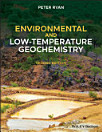Environmental and Low Temperature Geochemistry
Tentang eBook ini
• An introductory chapter that reviews basic chemical principles applied to environmental and low-temperature geochemistry
• Explanation and analysis of the importance of minerals in the environment
• Principles of aqueous geochemistry
• Organic compounds in the environment
• The role of microbes in processes such as biomineralization, elemental speciation and reduction-oxidation reactions
• Thorough coverage of the fundamentals of important geochemical cycles (C, N, P, S)
• Atmospheric chemistry
• Soil geochemistry
• The roles of stable isotopes in environmental analysis
• Radioactive and radiogenic isotopes as environmental tracers and environmental contaminants
• Principles and examples of instrumental analysis in environmental geochemistry
The text concludes with a case study of surface water and groundwater contamination that includes interactions and reactions of naturally-derived inorganic substances and introduced organic compounds (fuels and solvents), and illustrates the importance of interdisciplinary analysis in environmental geochemistry.
Readership: Advanced undergraduate and graduate students studying environmental/low T geochemistry as part of an earth science, environmental science or related program.
Additional resources for this book can be found at: www.wiley.com/go/ryan/geochemistry.
Tentang pengarang
Peter Crowley Ryan is Professor of Geology and Environmental Studies at Middlebury College where he teaches courses in environmental geochemistry, hydrology, sedimentary geology and interdisciplinary environmental science. He received a Ph.D. in geology at Dartmouth College, an M.S. in geology from the University of Montana and a B.A. in earth sciences from Dartmouth College. He has served as Director of the Program in Environmental Studies and as Chair of the Department of Geology at Middlebury College. His research interests fall into two main areas: (1) understanding the geological and mineralogical controls on trace-element speciation, particularly the occurrence and mobility of arsenic and uranium in bedrock aquifers; and (2) the temporal evolution of marine terrace soils in the tropics, with emphasis on mechanisms and rates of mineralogical reactions, nutrient cycling and application of soil geochemical analysis to correlation and geological interpretation.








